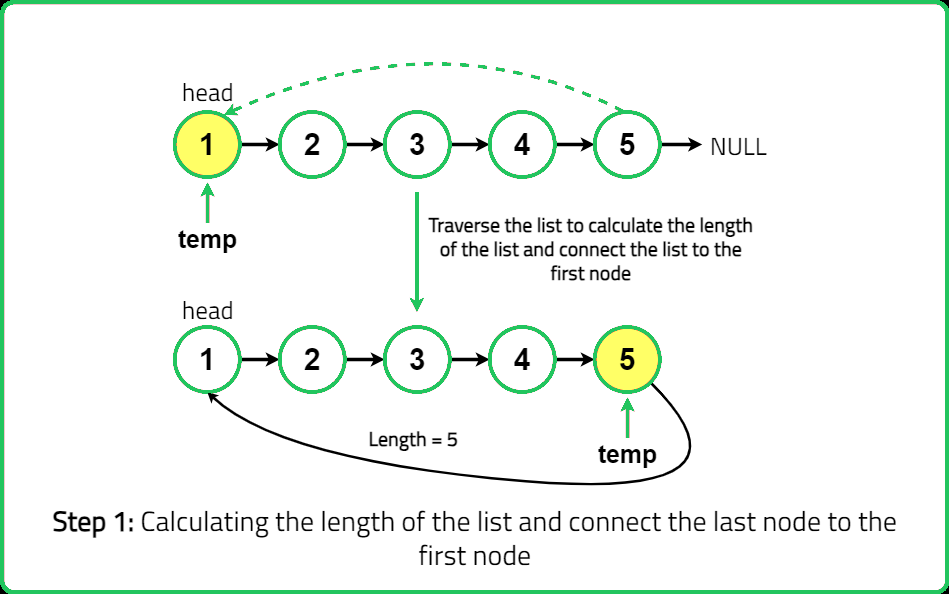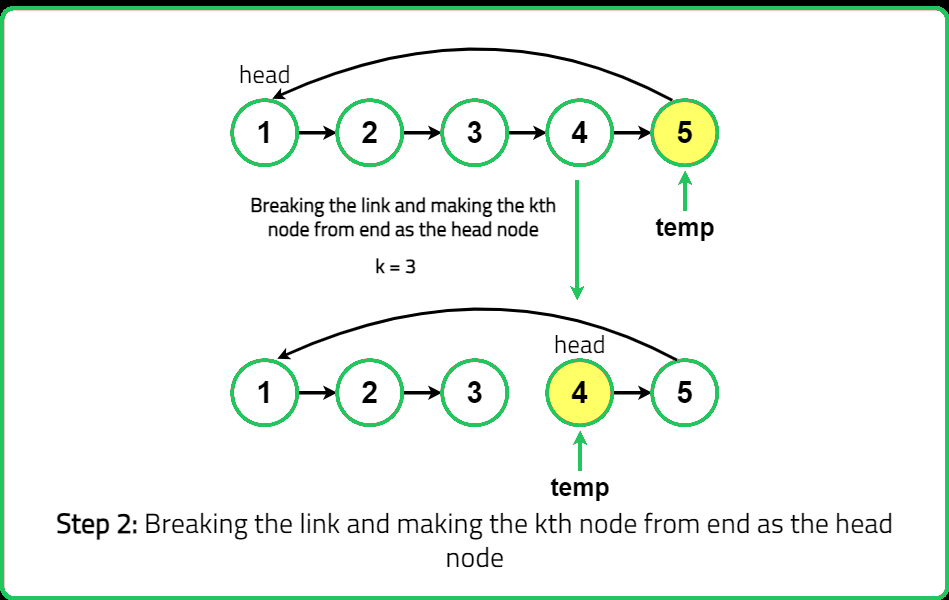12345678910111213141516171819202122232425262728293031323334353637383940414243444546474849505152535455565758596061626364656667686970717273747576777879808182838485868788899091929394
#include <bits/stdc++.h>
using namespace std;
// Definition of singly linked list
struct ListNode {
int val;
ListNode *next;
ListNode() {
val = 0;
next = NULL;
}
ListNode(int data1) {
val = data1;
next = NULL;
}
ListNode(int data1, ListNode *next1) {
val = data1;
next = next1;
}
};
class Solution {
public:
// Function to rotate the list by k steps
ListNode* rotateRight(ListNode* head, int k) {
// Base case: if list is empty or has only one node
if (head == NULL || head->next == NULL) return head;
// Perform rotation k times
for (int i = 0; i < k; i++) {
ListNode* temp = head;
// Find the second last node
while (temp->next->next != NULL)
temp = temp->next;
// Get the last node
ListNode* end = temp->next;
// Break the link between
// second last and last node
temp->next = NULL;
// Make the last node
// as new head
end->next = head;
head = end;
}
return head;
}
};
// Utility function to insert node at the end of the list
void insertNode(ListNode* &head, int val) {
ListNode* newNode = new ListNode(val);
if (head == NULL) {
head = newNode;
return;
}
ListNode* temp = head;
while (temp->next != NULL) temp = temp->next;
temp->next = newNode;
}
// Utility function to print list
void printList(ListNode* head) {
while (head != NULL) {
cout << head->val;
if (head->next != NULL) cout << "->";
head = head->next;
}
cout << endl;
}
int main() {
ListNode* head = NULL;
// Inserting nodes
insertNode(head, 1);
insertNode(head, 2);
insertNode(head, 3);
insertNode(head, 4);
insertNode(head, 5);
cout << "Original list: ";
printList(head);
int k = 2;
Solution solution;
// Calling function for rotating right by k times
ListNode* newHead = solution.rotateRight(head, k);
cout << "After " << k << " iterations: ";
// List after rotating nodes
printList(newHead);
return 0;
}
1234567891011121314151617181920212223242526272829303132333435363738394041424344454647484950515253545556575859606162636465666768697071727374757677787980818283848586878889
import java.util.*;
// Definition of singly linked list
class ListNode {
int val;
ListNode next;
ListNode() {
val = 0;
next = null;
}
ListNode(int data1) {
val = data1;
next = null;
}
ListNode(int data1, ListNode next1) {
val = data1;
next = next1;
}
}
class Solution {
// Function to rotate the list by k steps
public ListNode rotateRight(ListNode head, int k) {
// Base case: if list is empty or has only one node
if (head == null || head.next == null)
return head;
// Perform rotation k times
for (int i = 0; i < k; i++) {
ListNode temp = head;
// Find the second last node
while (temp.next.next != null) temp = temp.next;
// Get the last node
ListNode end = temp.next;
// Break the link between
// second last and last node
temp.next = null;
// Make the last node
// as new head
end.next = head;
head = end;
}
return head;
}
}
// Utility function to insert node at the end of the list
public static void insertNode(ListNode head, int val) {
ListNode newNode = new ListNode(val);
if (head == null) {
head = newNode;
return;
}
ListNode temp = head;
while (temp.next != null) temp = temp.next;
temp.next = newNode;
}
// Utility function to print list
public static void printList(ListNode head) {
while (head != null) {
System.out.print(head.val);
if (head.next != null) System.out.print("->");
head = head.next;
}
System.out.println();
}
public static void main(String[] args) {
ListNode head = new ListNode(1);
// Inserting nodes
insertNode(head, 2);
insertNode(head, 3);
insertNode(head, 4);
insertNode(head, 5);
System.out.print("Original list: ");
printList(head);
int k = 2;
Solution solution = new Solution();
// Calling function for rotating right by k times
ListNode newHead = solution.rotateRight(head, k);
System.out.print("After " + k + " iterations: ");
// List after rotating nodes
printList(newHead);
}
123456789101112131415161718192021222324252627282930313233343536373839404142434445464748495051525354555657585960616263646566676869
# Definition of Single Linked List
class ListNode:
def __init__(self, val=0, next=None):
self.val = val
self.next = next
class Solution:
# Function to rotate the list by k steps
def rotateRight(self, head: ListNode, k: int) -> ListNode:
# Base case: if list is empty or has only one node
if not head or not head.next:
return head
# Perform rotation k times
for _ in range(k):
temp = head
# Find the second last node
while temp.next.next:
temp = temp.next
# Get the last node
end = temp.next
# Break the link between
# second last and last node
temp.next = None
# Make the last node
# as new head
end.next = head
head = end
return head
# Utility function to insert node at end of list
def insert_node(head, val):
new_node = ListNode(val)
if not head:
return new_node
temp = head
while temp.next:
temp = temp.next
temp.next = new_node
return head
# Utility function to print list
def print_list(head):
while head:
print(head.val, end="->" if head.next else "")
head = head.next
print()
if __name__ == "__main__":
head = ListNode(1)
# Inserting nodes
head = insert_node(head, 2)
head = insert_node(head, 3)
head = insert_node(head, 4)
head = insert_node(head, 5)
print("Original list: ", end="")
print_list(head)
k = 2
solution = Solution()
# Calling function for rotating right by k times
new_head = solution.rotateRight(head, k)
print(f"After {k} iterations: ", end="")
# List after rotating nodes
print_list(new_head)
123456789101112131415161718192021222324252627282930313233343536373839404142434445464748495051525354555657585960616263646566676869707172737475
// Definition of Single Linked List
class ListNode {
constructor(val = 0, next = null) {
this.val = val;
this.next = next;
}
}
class Solution {
// Function to rotate the list by k steps
rotateRight(head, k) {
// Base case: if list is empty or has only one node
if (!head || !head.next)
return head;
// Perform rotation k times
for (let i = 0; i < k; i++) {
let temp = head;
// Find the second last node
while (temp.next.next) temp = temp.next;
// Get the last node
let end = temp.next;
// Break the link between
// second last and last node
temp.next = null;
// Make the last node
// as new head
end.next = head;
head = end;
}
return head;
}
}
// Utility function to insert node at end of list
function insertNode(head, val) {
let newNode = new ListNode(val);
if (!head) {
return newNode;
}
let temp = head;
while (temp.next) temp = temp.next;
temp.next = newNode;
return head;
}
// Utility function to print list
function printList(head) {
while (head) {
process.stdout.write(head.val.toString());
if (head.next) process.stdout.write("->");
head = head.next;
}
console.log();
}
let head = new ListNode(1);
// Inserting nodes
head = insertNode(head, 2);
head = insertNode(head, 3);
head = insertNode(head, 4);
head = insertNode(head, 5);
console.log("Original list: ");
printList(head);
let k = 2;
let solution = new Solution();
// Calling function for rotating right by k times
let newHead = solution.rotateRight(head, k);
console.log("After " + k + " iterations: ");
// List after rotating nodes
printList(newHead);


